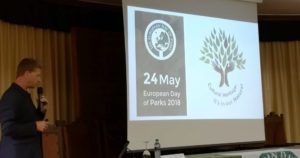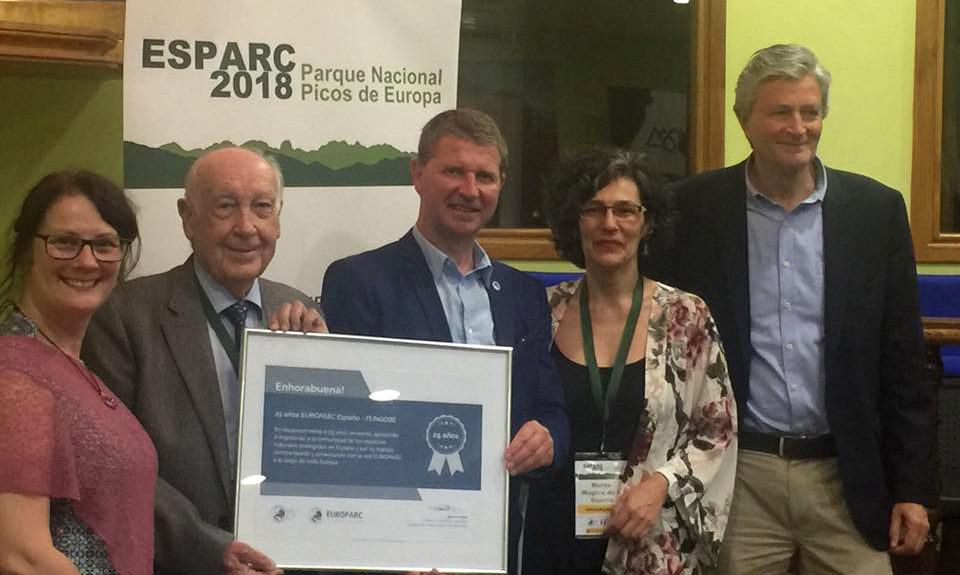New coordination of the EUROPARC Central and Eastern Europe Section
The EUROPARC Central and Eastern Europe (CEE) Section is the youngest among the network of EUROPARC Sections. It was established in 2015 as an expansion of the Czech Section and currently includes 30 members from eight countries (Bulgaria, Croatia, Czech Republic, Hungary, Poland, Romania, Slovakia and Slovenia).
New coordination – EUROPARC Central and Eastern Europe
During the 4th Members’ Assembly, that took place in Csopak, Hungary between 18th-20th April 2018, the new secretariat of the CEE Section took over. The first Secretariat of the CEE Section was the Krkonoše National Park Authority (Czech Republic) with the Presidency of Jakub Kašpar and the Coordination of Michael Hošek between 2015 and 2018.
The Assembly-session was held on 19th April 2018 in the Park Villa Guest House of Balaton Uplands National Park Directorate in Csopak, Hungary. In the name of Mr. Zoltán Puskás, Director of Balaton Uplands National Park Directorate, Ms. Márta Veszelszki, Deputy Director of Balaton Uplands National Park Directorate, greeted the representatives.
Michael Hošek, the coordinator of the Section summarized the first three years of the Section. Jakub Kašpar, the President of the Section handed over the official flag and plaque of the Section together with the three-year presidency for Gábor Szilágyi, from the Hortobágy National Park in Hungary. The new Coordinator is Csaba Bereczki.
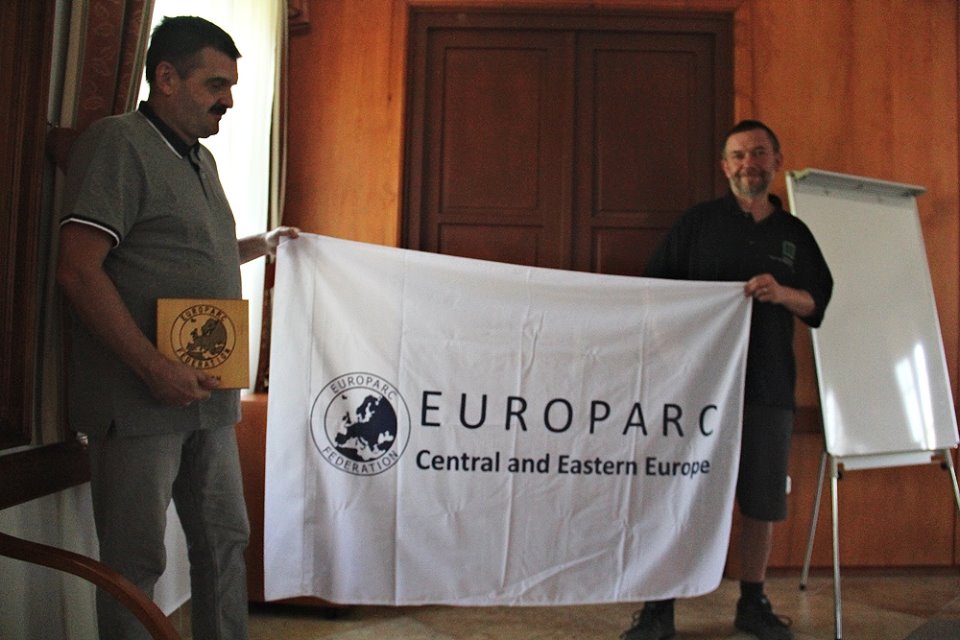
Jakub Kašpar, handing over the flag to Gábor Szilágyi, new President of the Section, representing Hungary © Michael Hošek
The new president introduced the most important topics for the next three years. The Assembly discussed and commented on all the topics:
Topic 1: What we are proud of (project management know-how):
besides the original idea of sharing good (and bad) examples of closed projects, the Section should focus on more efficient use of EU funds. For this, proposal writing and project manager experts should be involved. The participants agreed that “proud of” things and projects should be listed, or assessed in a sort of database in order to give opportunity for anybody to find “best-practices” during their planning or work, and also, to visit and learn from the owner of the project, practice, knowledge.
The participants started to make a list of “to be proud of”:
- Hortobágy National Park Directorate, Hungary:
management and eradication of invasive alien (plant) species, project proposal writing and project management
- Krokonoše Mountains National Park Administration, Czechia:
forest management, grassland habitat monitoring, environmental education
- Balaton Uplands National Park Directorate, Hungary:
project management, habitat management by domesticated animals, ecotourism
- Ministry of Agriculture, Hungary:
nature conservation friendly power-lines
- Duna-Dráva National Park Directorate, Hungary:
restoration of oxbow lakes, environmental education
- Danube Delta Biosphere Reserve Authority, Romania:
ecological restoration, networking, international cooperation
- Körös-Maros National Park Directorate, Hungary:
grassland management, wetland management, restoration of natural water-regimes, (initial success in) management of invasive alien species
- Danube-Ipoly National Park Directorate, Hungary:
management and eradication of invasive alien species. environmental education
- Kiskunság National Park Directorate, Hungary:
ranger service, communication to locals
- Public Institution Kornati National Park, Croatia:
eco-standards for tourism
- Őrség National Park Directorate, Hungary:
communication to locals, transboundary cooperation (Austria, Slovenia), networking in eco-tourism, butterfly focused grassland management
- State Nature Conservancy of the Slovak Republic, Slovakia:
conservation of large carnivores
Topic 2: Invasive alien species management:
the problem of IAS is still one of the hottest topics in the EU, so this should be kept on the surface. In the upcoming three years the Section should focus on sharing the practical management techniques. Sometimes Members feel that funding these eradication measures is problematic. Regarding this, the Section suggested to combine and connect different funding sources (Visegrad Group 4+4, Carpathian Convention, Natura 2000 Biogeographical Processes, etc.) or even think about the problem out of the box.
Topic 3: Experiences in applying Article 6 of the Habitats Directive:
after some discussion, the Section will keep this topic, too. The idea is to share good and bad examples, even sector by sector, how members and other bodies implement the article’s provisions, what kind of compensatory measures could be made. In 2017, 2 examples from the CEE Section were shared in an EUROPARC webinar focused on the implementation of the Habitats Directive.
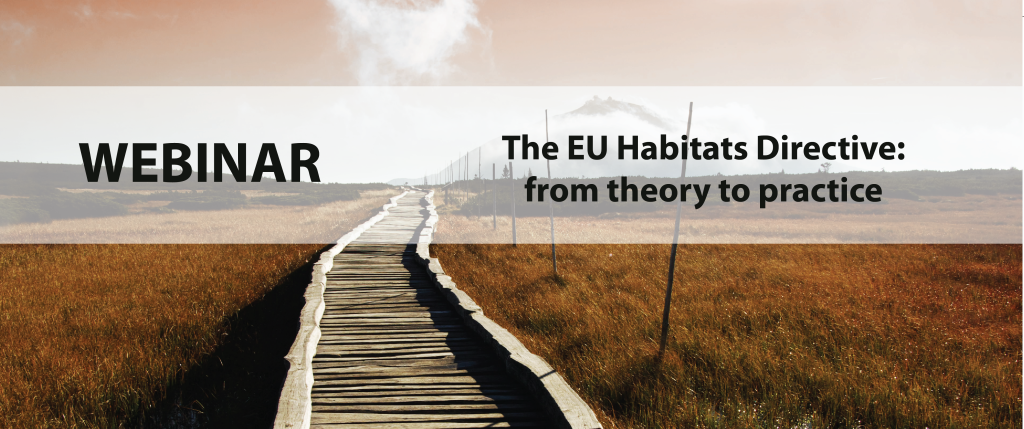
Click on the image to access the recording of the webinar and download the presentations
Topic 4: The impact of agro-environmental schemes on Natura 2000 areas:
in order to inform the EU, key studies of good and bad examples about the implementation of agro-environmental schemes will be provided by the members.
Topic 5: Awareness raising:
during the Assembly, most of the representatives emphasized the importance of awareness raising. Laymen, people out of nature conservation and experts from other sectors are most of the time not aware of what nature conservationists do, and what are the results of spending EU, state or private money on nature conservation projects. It turned out, that probably this could be the most important topic for the next three years to learn how to promote nature conservation and its results to people, and how can we find a common language to others in order to make them support nature conservation.
In order to reach this, we have to become acquainted with terms like ecosystem services, climate change mitigation, green infrastructure, sustainable development, etc. One possible cause of the lack of proper communication is that most of the time nature conservationists try to deal with communication and project result selling. In order to be more successful in this, experts in communication should be involved in the work of the Section, making workshops, seminars, lectures.
Topic 6: Organisational development:
the Section has 28 members, however, only some of them are active. The sleeping members should be reactivated, and also new members should be recruited during the upcoming three years. Watch the video of the Central and Eastern Europe, where Jakub Kaspar highlights the main challenges of the Section.
Extra topics that have arisen during the assembly:
- ecosystem services (besides Topic 5)
- maintenance of project results (might connect to Topic 1)
- wetland management (might connect to Topic 1)
ESPARC 2018 and the Inspiring Experiences Award – EUROPARC Spain
Past, present, and future of Protected Areas
EUROPARC-Spain celebrated its 20th Congress – ESPARC 2018 – in Picos de Europa National Park. 160 professionals joined the celebration of the 25th anniversary of EUROPARC-Spain and the first centenary of Spanish National Parks.
With a three days packed programme, Protected Area professionals, planners/managers of Natura 2000 sites from across Spain had the opportunity to share experiences within the technical workshops and the marketplace but got also inspiration and new ideas to implement in their Parks with the invited keynote speakers. A diverse audience of professionals working for environmental non-governmental organisations, regional administrative bodies and researchers, also joined the Conference adding value and different perspectives into the discussions held.
ESPARC 2018, a professional meeting forum
The opening event was presided by Fernando Lastra Valdés, Minister of Infrastructure, Spatial Planning and Environment of the Principality of Asturias, as President of the Inter-Autonomous Consortium of the Picos de Europa National Park, and Rafael Mata Olmo, President of EUROPARC-Spain. After the official inauguration, Amaia Barredo, Vice-President of EUROPARC-Spain, read the manifesto “For another century of parks”, a statement on the important role of protected areas in the conservation of natural and cultural heritage and their contribution to human well-being. Eduardo Martínez de Pisón, Emeritus Professor of Geography at the Autonomous University of Madrid gave a lecture on the past, present and future of protected areas.
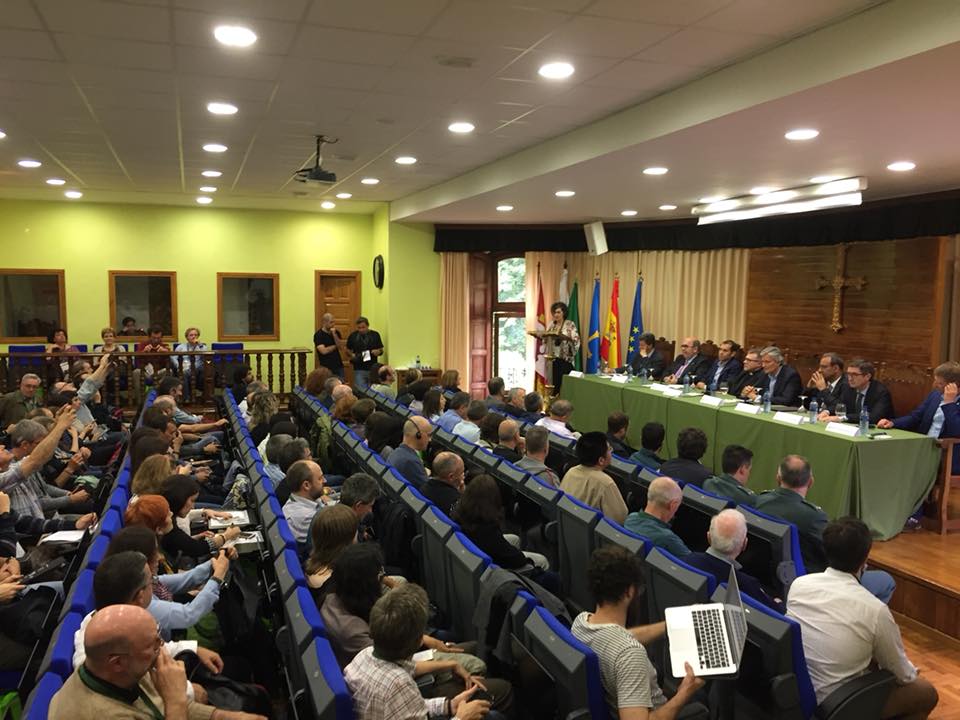
The workshops addressed some of the main challenges of protected areas identified in the Society and Protected Areas promoted by EUROPARC-Spain, such as:
- Social benefits: health and cultural heritage
- Contribution to socio-economic dynamism
- Challenges derived from global change
- Conservation status of the terrestrial and marine Natura 2000 network
- Diversification of governance formulas
On the 24th of May, the European Day of Parks, the morning session was opened by EUROPARC Presidente, Ignace Schops, who spoke about the work of the Federation in Brussels and explained the importance of celebrating Protected Areas at the highest level. To close his speech, Ignace praised EUROPARC Spain for the celebration of their 25th Anniversary, working for nature in Spain, connecting to Europe and representing EUROPARC so professionally.
The Inspiring Experiences Award
During ESPARC, EUROPARC-Spain announced the first edition of the INSPIRING EXPERIENCES in Protected Areas Award, with the aim to recognise, value anddisseminate initiatives that are contributing to the implementation of the Programme “Society and Protected Areas”.
Awardees
- Inspiring Experiences Award in the special category of climate change: Forest management for climate change adaptation in the Montseny Natural Park
- Inspirational Experiences Award in the category of EUROPARC-Spain members: The planning strategy of the Natura 2000 Network in Castilla y León
- Inspirational Experiences Award in the category of other entities involved: El Tancat de la Pipa as a model of participatory management and land stewardship in the Albufera Natural Park of Valencia
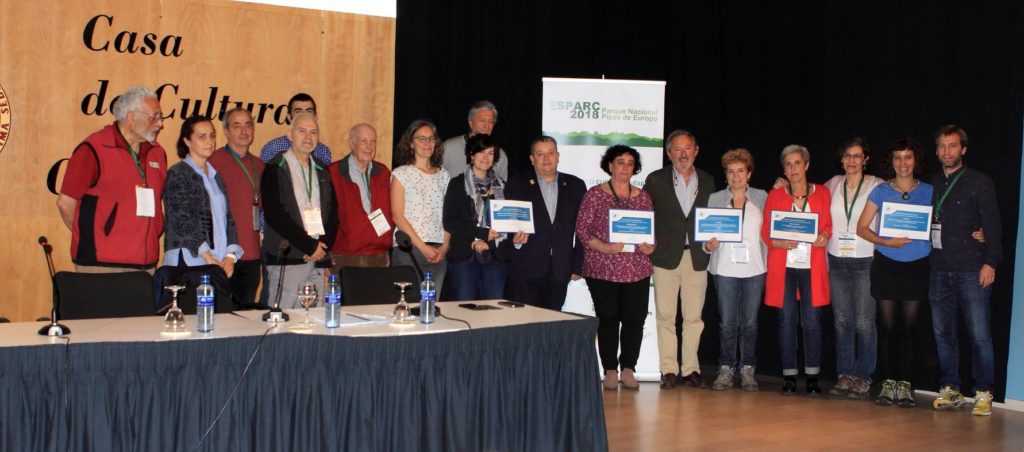
The Inspiring Experiences Award is a call to action to address the major challenges of protected natural areas. Awardees at ESPARC 2018
A general category was convened in which the member administrations of EUROPARC-Spain, on the one hand, and other entities involved in protected areas, from town halls to non-governmental organizations and other public administrations, on the other, can participate.
A special category of adaptation to climate change was also convened thanks to the support of the Biodiversity Foundation of the Ministry of Agriculture and Fisheries, Food and the Environment in the framework of the project “Promoting adaptation to climate change in the management of protected areas in Spain” developed by the Fernando González Bernáldez Foundation and EUROPARC-Spain.
High quality of the initiatives presented
A total of 51 projects have been received for the call: 24 projects in the EUROPARC-Spain member category, 22 projects in the category of other entities involved in protected areas and 5 projects in the special category of adaptation to climate change.
The jury particularly valued the participative (diversity of actors involved, support and social involvement), innovative (methodological and conceptual approaches) and inspiring (replicable) nature of the projects.
The ESPARC 2018 Congress: past, present and future of protected areas, was organised by EUROPARC-Spain and the Interautonomic Consortium of the Picos de Europa National Park, between the 23 to 27 May 2018 in Covadonga and Cangas de Onís, with the collaboration of the Autonomous Organism National Parks, the City Council of Cangas de Onís and the Royal Collegiate, Basilica and Real Sitio de Covadonga. The XX Congress of EUROPARC-Spain has the support of the Ministry of Agriculture and Fisheries, Food and Environment, through the Biodiversity Foundation.
Natura 2000 Awards – Winners 2018
Natura 2000 Awards Ceremony 2018 © European Commission
Twenty-five finalists were present on 17 May 2018 in the Ceremony of Natura 2000 Awards, that took place in the Berlaymont in Brussels. The Ceremony was chaired by Karmenu Vella, the European Commissioner for the Environment, Maritime Affairs and Fisheries. Curiosity and adrenalin, to know who the winners were, reigned the atmosphere of the ceremony;
even though each of them knew that their presence there was a win itself and an opportunity to talk and to learn with each other.
Estonia, Greece, Hungary, Portugal, Spain, United Kingdom, and a transboundary project between Greece, Bulgaria were the six winners.
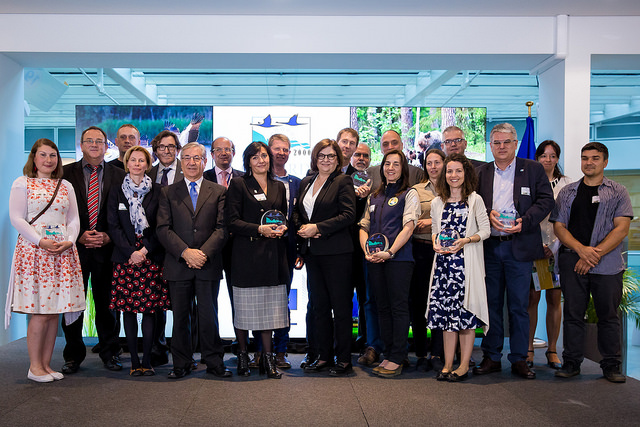
Winners of the Natura 2000 with the members of the EU Commission – DG Environment and the Jury, where Ignace Schops, EUROPARC President, represented the NGOs perspective
Ignace Schops, EUROPARC President, was a member of the jury representing NGOs and attested how difficult of the decision of the final awardees. The other members of the Jury were:
- Daniel Calleja Crespo – Director General of DG Environment;
- Adina Ioana Vālean – Member of EP, Chairwoman of the Environment, Public Health and Food Safety Commitee;
- Roby Biwer – first Vice Chairs of the Commission for the Environment, Climate Change and Energy for the Committee of Regions (CoR);
- Diane Mitchell – Vice-chair of the COPA-COGECA Environment Working Group and Chief Environmental Adviser of the National Farmers’ Union of England and Wales.
Watch the films:
- Natura 2000 Award – Delivering the Awards;
- Natura 2000 Award video 2;
- Natura 2000 Award video 3;
- Natura 2000 Award video 4
Get to know the Winners!
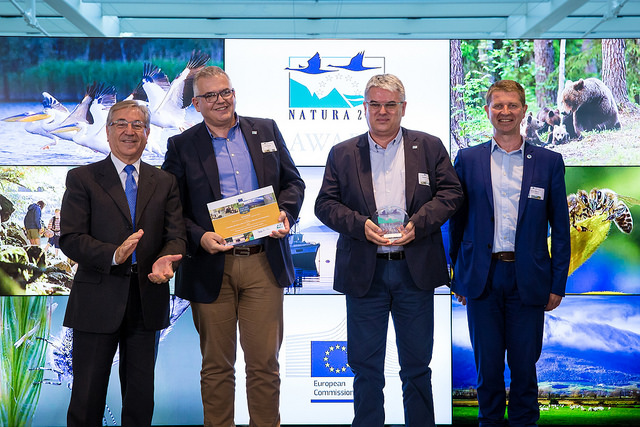
Ignace Schops with Commissioner Karmenu Vella delivering the Natura 2000 Award “Reconciling Interests/Perceptions” to Callisto NGO (Greece) © European Commission
The Conservation Award went to the “Partnership to stop the poisoning of imperial eagles ” for addressing very effectively the illegal poisoning of the Imperial Eagle in Hungary, made by MME BirdLife.
In the Communication field won the project “Natura 2000: Connecting people with biodiversity“. The Spanish team composed by SEO / BirdLife and EFE; have implemented the awareness of Natura2000 from 10% to 22%.
“Co-existing with bears in the 21st century: Difficulties and achievements” won the category for Reconciling interests/perceptions; Callisto increased significantly local tolerance towards bears in Greece.
The gold medal for the Socio-Economic Benefits went to the project “LIFE to alvars: restoration and grazing reintroduction for 2500 hectares of Estonian alvar grasslands” where the Environmental Board of Estonia involved local farmers in the long-term management of Natura 2000 sites.
For the section Cross-border Cooperation, the “Joint conservation efforts across three continents to save the sacred bird” project won for its support to the Egyptian vulture, now on the edge of extinction. Greek and Bulgarian custom were trained to control the illegal trade in Egyptian vultures thanks to HOS; BSPB; RSPB and WWF Greece.
With more than 50.000 votes the European Citizens’ Award went to the “School of Nature” project in Viana do Castelo in Northern Portugal; they achieve to brings school communities, and thus local communities, closer to their unique natural heritage thanks to field activities and teachers’ trainings.
EUROPARC at the networking event
Before the Ceremony, the European Commission/DG ENVI organised a networking meeting to promote experience exchange among the finalists and share useful resources. EUROPARC was invited to presented our Toolkit “Be a Better Communicator: Tools and Tips to help Natura 2000 Managers” with who we hope you can find some good tools and tips to inspire the communications.
EUROPARC Spain was among the finalists of the category “Reconciling interests/perceptions” with the project Sports in Natura 2000: Reconciling interests in Menorca. Get to know all project finalists here.
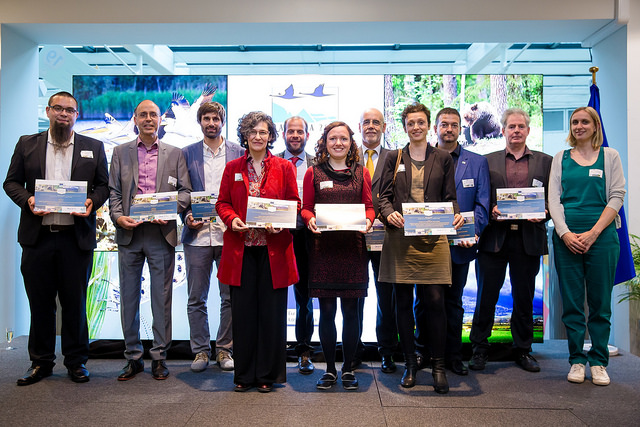
Finalists of the category “Reconciling interests/perceptions” © European Commission
About the Natura 2000 Awards
Every two years, the European Commission invites any organisation or person involved in Natura 2000, including public and local authorities, businesses, NGOs, landowners, educational institutions and individuals to showcase their work under 5 categories. EUROPARC Federation is an active supporter of the Natura 2000 Awards and, in this year’s edition, we were also partners in the promotion and communication activities.
Webinar: Solutions for European Protected Areas
On the European Day of Parks, 24th May, EUROPARC and PANORAMA Solutions come together to celebrate “Solutions from European Protected Areas“.
Webinar: Solutions from European Protected Areas
- 24th May – 11:30 CEST
- (Central Europe Summer Time)
- Duration: 1:15hours
- Register here
With this PANORAMA webinar, jointly hosted by EUROPARC and IUCN, we will promote examples of successful approaches from 2 different regions in Europe. Following introductions on the PANORAMA initiative, two solution providers (names and countries to be announced soon) will introduce their case studies and explain the key aspects that made them work. Participants will have the opportunity to ask questions and engage in a lively debate with the presenters.

PANORAMA – Solutions for a Healthy Planet is a partnership initiative to document and promote examples of inspiring, replicable solutions across a range of conservation and sustainable development topics, enabling cross-sectoral learning and inspiration. PANORAMA allows practitioners to share and reflect on their experiences, increase recognition for successful work, and to learn with their peers how similar challenges have been addressed around the globe. Solutions are being promoted through webinars, workshops, publications and other channels.
PANORAMA is a joint initiative of GIZ, IUCN, UN Environment, GRID-Arendal, Rare and IFOAM, with GIZ and IUCN in a leading role, but is principally open for solution contributions by any institution. All solutions can be accessed on the PANORAMA web platform: www.panorama.solutions.
Marie Fischborn will open the webinar with a presentation about the PANORAMA Solutions. Marie is with the Global Protected Areas Programme of the International Union for Conservation of Nature (IUCN). She is IUCN’s coordinator for the PANORAMA – Solutions for a Healthy Planet initiative on promoting and sharing successful approaches in conservation and sustainable development conservation and sustainable development , and leads IUCN’s business line on ‘protected area solutions’.
Case Study 1
Lands of Priolo: Integrated management to save a bird, recover natural habitats and promote sustainability
by Azucena de la Cruz, SPEA (BirdLife Portugal)
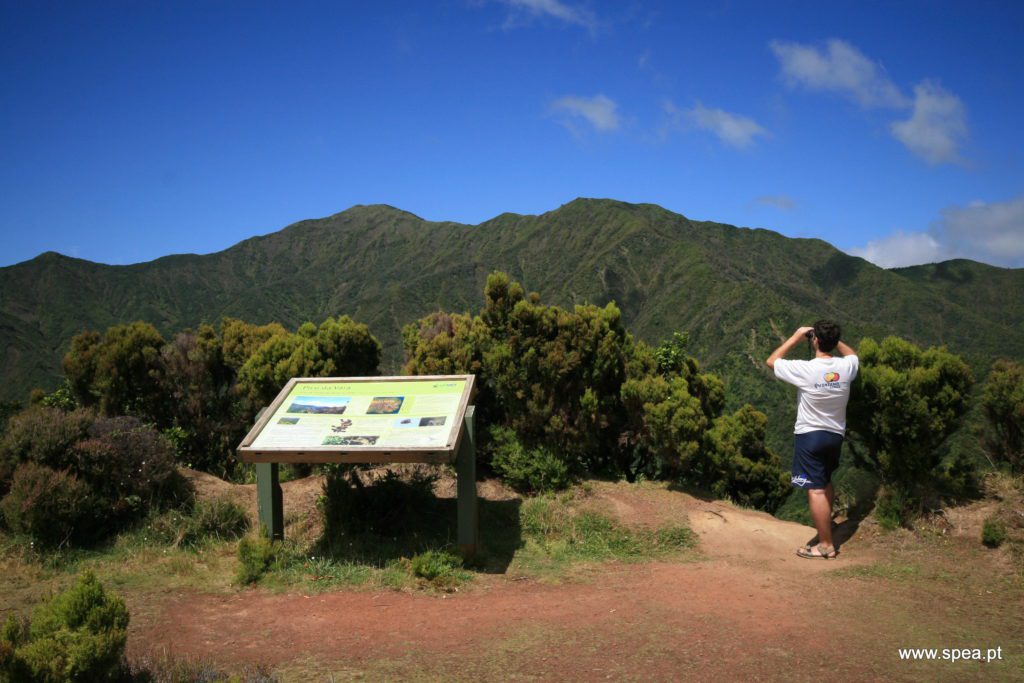
Terras do Priolo, photo by Joaquim Teodósio
The Azores Bullfinch Pyrrhula murina, Priolo in Portuguese, is one of the rarest and most endangered birds in Europe and can only be found in the east of the island of São Miguel, Azores. For the last 15 years, habitat restoration and other conservation actions have been conducted on the Special Protected Area (SPA) where this bird is found. These projects have had excellent results for the conservation of this bird, improving its status from “critically endangered” to “vulnerable”, and recovering unique habitats: laurel forest and peat bogs.
Management strategy included maximizing positive local socio-economic impacts, like job creation, expenses, educational opportunities, infrastructure creation and ecosystem services provision. This positive local impact, as well as efforts to raise awareness, have turned this bird into a symbol. The “Lands of Priolo” are now working to develop sustainable tourism that contributes to conservation of natural resources and local development.
Azucena de la Cruz is Co-Head of the Azores Department at SPEA (BirdLife Portugal). Graduated in Environmental Sciences and with postgraduate studies in Public Participation and Citizenships, Azucena is working with the Portuguese Society for the Study of Birds in Azores since 2016 having developed studies on Ecosystem Services and Management implications and coordinated the application of the “Lands of Priolo” to the European Charter for Sustainable Tourism.
Case Study 2
Caucasus Wildlife Refuge: Pioneering Private Conservation in Armenia
by Eva Martirosyan, Foundation for the Preservation of Wildlife and Cultural Assets, Armenia
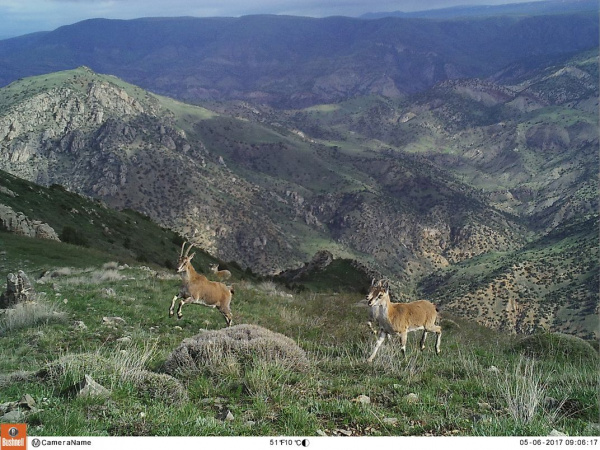
During the Soviet times, various ecosystems were largely affected by the mismanagement, large regulated and unregulated forest cuts, aggressive industrialization and agricultural development practices. The “visual assessment” and centralization approaches of the time did not allow Armenia to create inventory and monitoring techniques appropriate to the specific type of lands and management objectives, or to develop local expertise and infrastructure to monitor its land resources.
The independence years in Armenia have seen political violence and several economic shocks, imposing tremendous pressures on the forests as sources of energy and illegal income. Urban sprawl, tourism, illegal hunting and unregulated grazing have greatly impacted the nature reserves.
Establishment of the FPWC’s work started as a response to an immediate need to implement sustainable management approaches that are compatible with the new environmental, economic and socio-cultural developments of the country.
The webinar will be held in English and participation is free. You can register here. See the past EUROPARC webinars.
